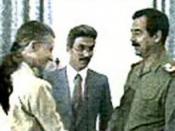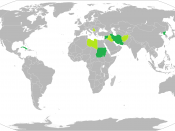The term 'rogue state' was first used by the U.S. after the end of the Cold War. The first state to be worthy of such a description was Panama, then under the rule of Manuel Noriega. Noriega's connection to drugs was the pretext for a December 1989 invasion by the United States military. The concept of the 'rogue state' has been central to the interventionist nature of American foreign policy since the end of the Second World War. The threat posed by alleged rogue states to domestic security has been used to justify foreign policy and other initiatives; for example renewed interest in and funding of anti-ballistic missile programs. North Korea, Iraq, Iran, Syria, and Libya have all been suggested as "rogue states", states not constrained by international norms and feared by other nations.
The term 'rogue state' was temporarily phased out in June 2000 by then secretary of state Madeline Albright.
In the last 6 months of the Clinton administration, it was replaced with the term "state of concern", due to concerns about the diplomatic effects of its use. However the Bush Jr. administration has had no qualms about resurrecting it alongside the use of such colourful rhetoric as 'axis of evil'. In 2000 the Center of Defense Information obtained a description of a new classification system, which breaks down 190 nations into six known subcategories. These range from "Just States" (our allies) to "States Leaving Concern" (the nations formerly known as rogues) to "States of Disrepair" (nations that have essentially broken down into anarchy). A State Department division called the Bureau of States is supposed to update the list annually and issues a classified report to Congress every April (Koerner 2003).
The terrorist attacks of September the 11th have highlighted an increasingly wide contrast between the way America...



Rogue
This well set out, well researched and you have named your sources.
2 out of 2 people found this comment useful.